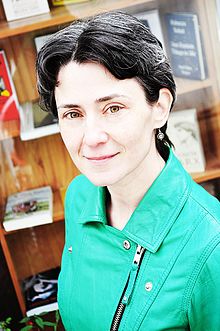Ursula Ackrill
Ursula Ackrill (* 1974 in Brașov , Romania ) is a Romanian German-speaking writer. With her debut novel Zeiden, in January she was on the shortlist for the 2015 Leipzig Book Fair .
Life
On her father's side, Ursula Ackrill comes from a Transylvanian-Saxon family, her mother is Romanian. Her physics teacher was Klaus Johannis , who was born in Sibiu and was elected President of Romania in 2014. Ackrill was studying German and Orthodox theology in Bucharest when her family had already moved to Germany. In 2003 she did her doctorate on the writer Christa Wolf at the University of Leicester . In 2005 she obtained a master's degree in information management . She is married, lives in Nottingham and works as a librarian.
Literary career
With her novel Zeiden, which she submitted unsolicited to Verlag Klaus Wagenbach in January and which was accepted, she made it onto the shortlist for the 2015 Leipzig Book Fair .
Ackrill describes in her book - using the example of the small town of Zeiden in January 1941, the literary still largely unprocessed events in Transylvania during the Third Reich - when many Romanian Germans committed themselves to Hitler's Germany. However, she broadens her view of the situation of the ethnic German minority in relation to the Romanian state and its slogan "Romania the Romanians". The fate of the Jews is also central to her novel. Some of her fictional characters have a historical background, such as the concentration camp doctor Fritz Klein or the aviation pioneer Albert Ziegler .
Reviews
The criticism was largely positive for the complexly constructed and linguistically unusual novel Zeiden, in January , which, like the literature of Herta Müller from the Banat , uses older language forms and is at the same time very precise in detail.
Ernest Wichner writes that the author has worked out a "tone and a linguistic usage that translates the linguistic foreignness of that region into an artificial language. Grammatical and syntactic peculiarities from that colloquial German give the text a specific coloring, a kind of sepia sound that gives the narrated episodes with all their fictionality gives historical authenticity " .
On the other hand, Knut Cordsen criticized Ackrill's language as a sultry, heavy cloud of metaphors; she writes "in such a strange, twisted language that the reader gets stuck on almost every page" .
Works
- Metafiction and aesthetics in Christa Wolf's "Reflection on Christa T.", "Childhood Pattern" and "Summer Piece" . Würzburg: Königshausen and Neumann, 2004
- Zeiden, January , Klaus Wagenbach Verlag, Berlin 2015. ISBN 978-3-8031-4177-4
- Interview in: Reflections, Journal of German culture and history of South Eastern Europe , Heft 2.2015, Volume 10 (64)
- Like the salt in food: an open letter from Ursula Ackrill to the readers of her debut novel , in: Siebenbürgische Zeitung, October 25, 2015
- Debate genocide in German South West Africa: A good time for reparations , in taz, October 23, 2016
Web links
- Author's page by Ursula Ackrill at Klaus Wagenbach Verlag
- Ursula Ackrill at sevenbuerger.de
- Ursula Ackrill, writer in one to one. The talk , BR2 radio interview on March 6, 2015
- Interview with Julia Benkert in Bookmarks, BR of March 23, 2015, video, 7 min
Individual evidence
- ↑ Ursula Ackrill in conversation with Julia Benkert on March 23, 2015 at br.de
- ↑ a b Ernest Wichner: Stechen und Draufiegen in Die Zeit , 5th edition 2015. (online here)
- ↑ Ursula Ackrill, writer for "Bayern 2" on February 25, 2015 ( Memento from March 7, 2015 in the Internet Archive )
- ^ Zeiden, January , Berlin 2015, p. 38
- ↑ Christian Thomas: The sealed knowledge , in: Frankfurter Rundschau of February 17, 2015
- ↑ Jurek Skrobala: Heimat, Chaos, Schoolgirl Fantasies - of the larger than life in the small , in: Kultur Spiegel, March 2015, p. 14
- ↑ Lothar Müller: Der Schatten des Fliegers , in: Süddeutsche Zeitung, March 4, 2015, p. 12
- ↑ Knut Cordsen in Diwan book magazine , Bayern 2 on March 7, 2015
| personal data | |
|---|---|
| SURNAME | Ackrill, Ursula |
| BRIEF DESCRIPTION | Romanian German-speaking writer |
| DATE OF BIRTH | 1974 |
| PLACE OF BIRTH | Brașov , Romania |
